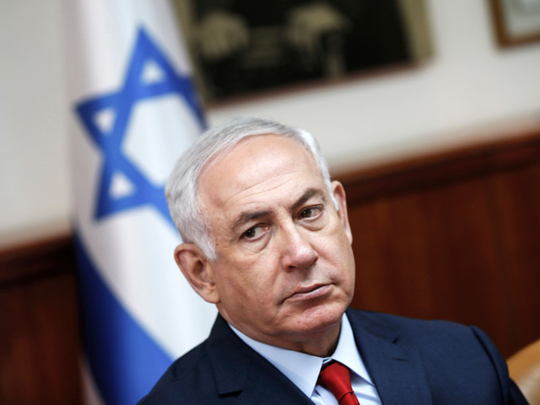
If for the last 23 years, peace between Jordan and Israel was described as “cold”, it is now definitely in the freezer! Relations have been tested since both countries signed a historic peace treaty in 1994; the killing by a Jordanian soldier of seven Israeli schoolgirls in March 1997 in Baquora in the Jordan Valley, the Mossad’s attempted assassination of Hamas leader, Khalid Mesha’al, in Amman in September 1997, marked differences over the course of the peace process, the recurrent incursions by Jewish zealots on Al Aqsa Mosque and unilateral Israeli measures in occupied Jerusalem’s Old City, among others.
In the wake of each incident, both countries were able to work out differences, mostly for an interim period, but over the course of the last two and half decades trust between Jordan and Israel has slowly eroded. While Jordan has been faithful to its commitments under the peace treaty, Israel has not. And there is one man to blame for this: Likud leader and Israeli Prime Minister Benyamin Netanyahu. It was under his watch, and by his orders, that Israeli secret agents attacked and poisoned Mesha’al in broad daylight in the heart of the Jordanian capital. The late king Hussain threatened to abrogate the treaty unless Netanyahu’s agents delivered the necessary antidote. Netanyahu caved in, and while the treaty and Mesha’al were saved, Hussain’s trust in Netanyahu had vanished.
There was no love lost between Hussain’s successor, King Abdullah II, and Netanyahu who was re-elected in 2009. Aside from abandoning peace negotiations with the Palestinians, Netanyahu had clearly no interest in pursuing the two-state solution; an issue that occupies Jordan’s top national security priority. But adding to Netanyahu’s negative stand over a peaceful resolution of the conflict with the Palestinians, he had challenged Jordan’s special role as a custodian of holy sites in Occupied east Jerusalem and allowed radical Jewish groups to carry out regular incursions of the Noble Sanctuary in a bold test of King Abdullah’s authority and patience.
Then came the cold-blooded murder by an Israeli embassy guard of two Jordanians in Amman on July 23. The crime had shocked Jordanians and strained relations in the midst of Al Aqsa crisis when Israel set up metal detectors at the entrances of the compound. Jordan agreed to allow the killer and all embassy staff to leave the kingdom against a promise by Netanyahu to launch a criminal investigation of the incident. Instead, Netanyahu welcomed the embassy guard as a hero and despite diplomatic pressure is yet to sanction full investigation and put the assailant on trial.
Netanyahu’s brazen reaction had angered the Jordanian king that he launched an unprecedented verbal attack against him in the following days. The king told officials at a meeting of the National Policies Council (NPC) few days after the Amman shooting that “The Israeli prime minister is required to honour his responsibilities and take the necessary legal measures to ensure that the killer is tried and justice is served, rather than exhibiting political showmanship in dealing with this crime to score personal political points.”
A diplomatic standoff had since followed with Jordan refusing to allow the Israeli ambassador and staff to return until a process of criminal justice is launched. But Israel has given no indication that such a process was about to take place. For Jordan it is now clear that the standoff will continue no matter the cost.
Netanyahu and his far-right cabinet have undermined relations with Jordan even as Israel’s security establishment continues to view such relations as strategic and essential. US attempts to mediate between the two countries have reportedly failed. Jordan cannot afford to compromise on an issue that could inflame an already angry public. The July killings have now been tied to an earlier incident, in 2014, when an Israeli soldier shot in cold blood a Jordanian judge as he was crossing the Jordan River into Palestinian territories. Israel then promised to carry out an investigation but never disclosed its findings.
The anti-Israel Jordanian public has been critical of last year’s revelation that the national electricity company had signed a ten-year agreement with Israel to supply the energy starved kingdom with natural gas. The Jordanian parliament is in the process of reviewing that unpopular agreement.
There is a growing perception in Amman that Netanyahu and his fellow far-right ministers have a diminished view of the peace treaty with Jordan. A number of Netanyahu’s cabinet ministers support the so-called “Jordan is Palestine” option and have openly and publicly claimed that a Palestinian state already exists in the East Bank of Jordan.
This week the Begin Centre in occupied Jerusalem hosted a conference titled “The Jordan Option: The Ultimate Alternate Solution” That so-called solution calls for Jordan to be a state for the Palestinians where all final-status issues will be resolved. While insignificant in its effect and outcome it is seen as another provocation by Netanyahu’s government of Jordan and its leadership.
While Jordan remains committed to the peace treaty with Israel, the time could come when Amman could either suspend or leave that agreement altogether if its feels that Israel, under an emboldened Netanyahu or his successor, is taking concrete steps that violates the letter and spirit of that deal. With Netanyahu looking adamant to bypass Jordan and the Palestinians in a bid to normalise relations with some Arab countries, relations with Jordan are unlikely to improve anytime soon.
Osama Al Sharif is a journalist and political commentator based in Amman.










